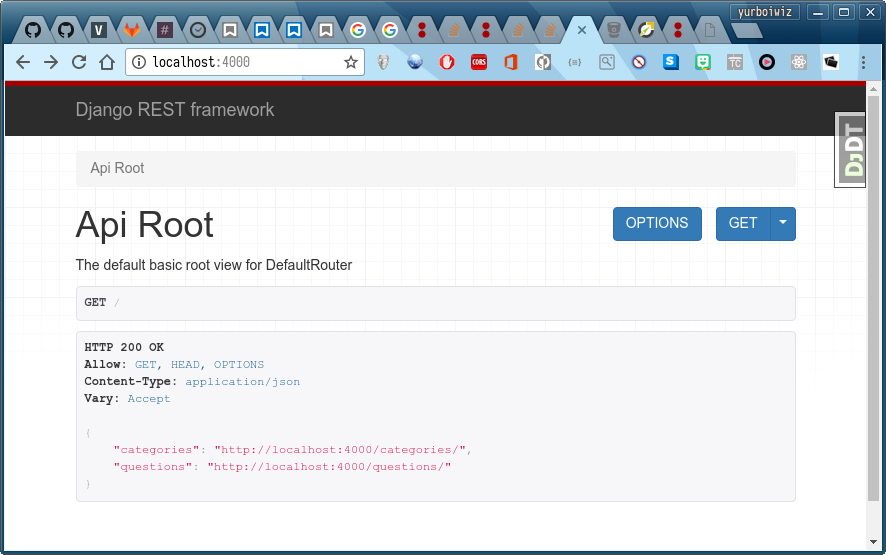Soo… Where I work, (As a Back-end Developer (Soon to be Full stack)), We’ve been working on changing the site architecture from a monolith (hope i spelt that right…im too lazy to google it) to a Microservice-y architecture.
Basically, these means that we’ll be breaking down the site into services that communicate with eachother via APIs.(Its mainly Django bdw) Now I’m working on this service, trying to replace the functionality thats in the current code base in my own microservice. Before today, this was my REST view using Django rest framework (DRF)
NB: If you haven’t heard of Django before, the rest of these stuff will be to you what PHP is to me
#A Simple FBV (function based view)
@api_view(http_method_names=['GET'])
def single_category(request, slug):
#This shii is in the models (does some DB manipulation Yada yada)
data = cached_category_skills(request.user, slug)
return Response(data=data, status=200)
#and my CBV (class based view)
class Categories(generics.ListAPIView):
model = Category
serializer_class = CategorySerializer
queryset = model.objects.all()
Straight forward yh? Its all good. Then I’ll hook ‘em up to the urls like this
url(r'^skill/categories/$', view=skill_views.Categories.as_view(), name="categories"),
url(r'^skill/categories/(?P<slug>[\w.@+-]+)', view=skill_views.single_category, name="category"),
This works… but little did I know that there was a simpler way to do this using DRF Introducing….Router and Viewsets…
A ViewSet class is simply a type of class-based View, that does not provide any method handlers such as .get() or .post(), and instead provides actions such as .list() and .create().
A Router is just a quick and consistent way of wiring your view logic to a set of URLs.
class CategoriesViewSet(viewsets.ModelViewSet):
serializer_class = CategorySerializer
lookup_field = "slug"
def get_queryset(self):
return Category.objects.all()
def retrieve(self, request, **kwargs):
instance = self.get_object()
serializer = SkillSerializer(instance.skill_set.all(), many=True)
return Response(serializer.data)
router = routers.DefaultRouter()
router.register(prefix=r'categories', viewset=CategoriesViewSet,
base_name="fetch_categories")
I’m not the official documentation so don’t expect me to gist you on what exactly this does
Then in my urls.py
url(r'^', include(views.router.urls)),
#Dassal
A lotta abstraction is done by the ModelViewSet class. Check this out.
class ModelViewSet(mixins.CreateModelMixin,
mixins.RetrieveModelMixin,
mixins.UpdateModelMixin,
mixins.DestroyModelMixin,
mixins.ListModelMixin,
GenericViewSet):
"""
A viewset that provides default `create()`, `retrieve()`, `update()`,
`partial_update()`, `destroy()` and `list()` actions.
"""
pass
Just Imagine the possibilities. Read the docs you’ll love it too. A lotta stuff that i woulda done manually has already been done by the ModelViewSet class. Including Browsable API Ish
Now to the testing…..
Damn… The funniest thing about unit tests in django is that the name of the test function must start with test
if not the test wouldn’t run e.g
class BaseTestCase(TestCase):
def test_price_of_pure_water_will_return_to_five_naira(self):
pass
This stupid thing kept me up one night. Bdw I use django-test-plus for testing, cool library, you should check it out.
It provides a lot of method that the default django test doesn’t.
So apparently, I learnt from the CTO (cool guy) today that your test for the views should also test the actual expected result, so here’s a sample of one of my unit tests
def test_quiz_questions_are_fecthed_for_quiz(self):
response = self.client.get(
reverse('quiz:fetch_questions-detail', kwargs={'url': self.skill1.quiz.url}))
data = response.json()
self.response_200(response)
self.assertEqual(len(data), 1)
self.assertEqual(data, [{'answer_set': [{'content': '', 'correct': False, 'id': 168}, {'content': '', 'correct': False, 'id': 167}, {
'content': '', 'correct': True, 'id': 166}, {'content': '', 'correct': False, 'id': 165}], 'content': 'whats my name?', 'id': 0}])
I couldn’t be more explicit ;)
I usually first test for a 200 response before I test the data… Im just used to It.
The self.client.get comes from django-test-plus
Finally, there’s also this cool library django-extensions check it on github, I’ve been using it for a while, but didnt know about the management commands including:
$ python manage.py shell_plus
and
$ python manage.py show_urls
Damn good stuff
shell_plus gives some kinda Ipython interface while show_urls shows you the urls in your project and the views the point to
here are a list of other stuff that exist
[django_extensions]
admin_generator
clean_pyc
clear_cache
compile_pyc
create_app
create_command
create_jobs
create_template_tags
delete_squashed_migrations
describe_form
drop_test_database
dumpscript
export_emails
find_template
generate_secret_key
graph_models
mail_debug
notes
passwd
pipchecker
print_settings
print_user_for_session
reset_db
runjob
runjobs
runprofileserver
runscript
runserver_plus
set_default_site
set_fake_emails
set_fake_passwords
shell_plus
show_template_tags
show_templatetags
show_urls
sqlcreate
sqldiff
sqldsn
sync_s3
syncdata
unreferenced_files
update_permissions
validate_templates
Really cool stuff…
Now I’m off to more debugging.
PS: check out this Wakatime extension. It tracks the amount of time you spend coding on your text editor.
comments powered by Disqus
